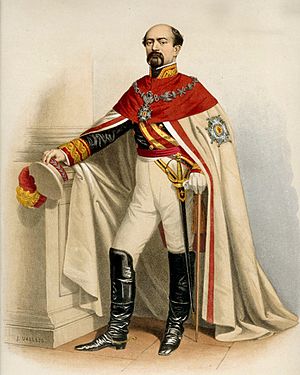Manuel Pavía y Lacy facts for kids
Quick facts for kids
The Most Excellent
The Marquess of Novaliches
|
|
|---|---|
 |
|
| Governor-General of the Philippines | |
| In office 2 February 1854 – 28 October 1854 |
|
| Monarch | Isabella II of Spain |
| Preceded by | Ramón Montero y Blandino |
| Succeeded by | Ramón Montero y Blandino |
| Personal details | |
| Born |
Manuel Pavía y Lacy
6 July 1814 Madrid, Spain |
| Died | 22 October 1896 (aged 82) Madrid, Spain |
Manuel Pavía y Lacy, 1st Marquess of Novaliches (born July 6, 1814 – died October 22, 1896), was an important Spanish general, known as a marshal. He had a long career in the military and in politics.
Contents
Early Life and Military Career
Manuel Pavía y Lacy was born in Granada, Spain, on July 6, 1814. His father was a colonel in the army. Manuel went to a Jesuit school in Valencia for a few years. Later, he joined the Royal Artillery Academy in Segovia to train as a soldier.
In 1833, he became a lieutenant, which is a junior officer. He served in the guards of Queen Isabella II. During the Carlist War (1833-1840), a civil war in Spain, he quickly rose through the ranks. By 1840, at just 26 years old, he became a general.
Political Roles and Reforms
In 1847, Manuel Pavía became the Minister of War. This meant he was in charge of the army. He was sent to Catalonia to stop a rebellion, but it was a difficult task.
He also became a senator in 1845, which is a member of the government. In 1848, he was given the title of marquess, a high noble rank.
Governor of the Philippines
In 1852, Manuel Pavía was sent to Manila to be the governor-general of the Philippines. This was a very important job. In April 1854, he successfully put down a large rebellion there. He also made many helpful changes and improvements in the Philippines.
After his time in the Philippines, he returned to Spain. He got married to the Countess of Santa Isabel.
Later Political Life
Manuel Pavía also served in the war with Morocco. He was offered the job of Minister of War two more times but turned it down.
In 1864, he briefly became the president of the government, which is like a prime minister. His government was made up of conservative-liberal politicians, but it only lasted for a few days.
Key Battles and Later Years
In 1866, he volunteered to help stop a rebellion in Madrid. When a big revolution started in September 1868, he took command of Queen Isabella's troops.
He fought against Marshal Serrano at the bridge of Alcolea on September 28, 1868. Pavía's troops were defeated, and he was badly wounded in the face. This injury left him disfigured for the rest of his life.
After a new king, Alfonso XII of Spain, came to power in 1875, Pavía was again made a senator. The new king also gave him the Golden Fleece, a very special award.
Manuel Pavía y Lacy died in Madrid on October 22, 1896.
See also
 In Spanish: Manuel Pavía y Lacy para niños
In Spanish: Manuel Pavía y Lacy para niños
 | William L. Dawson |
 | W. E. B. Du Bois |
 | Harry Belafonte |

